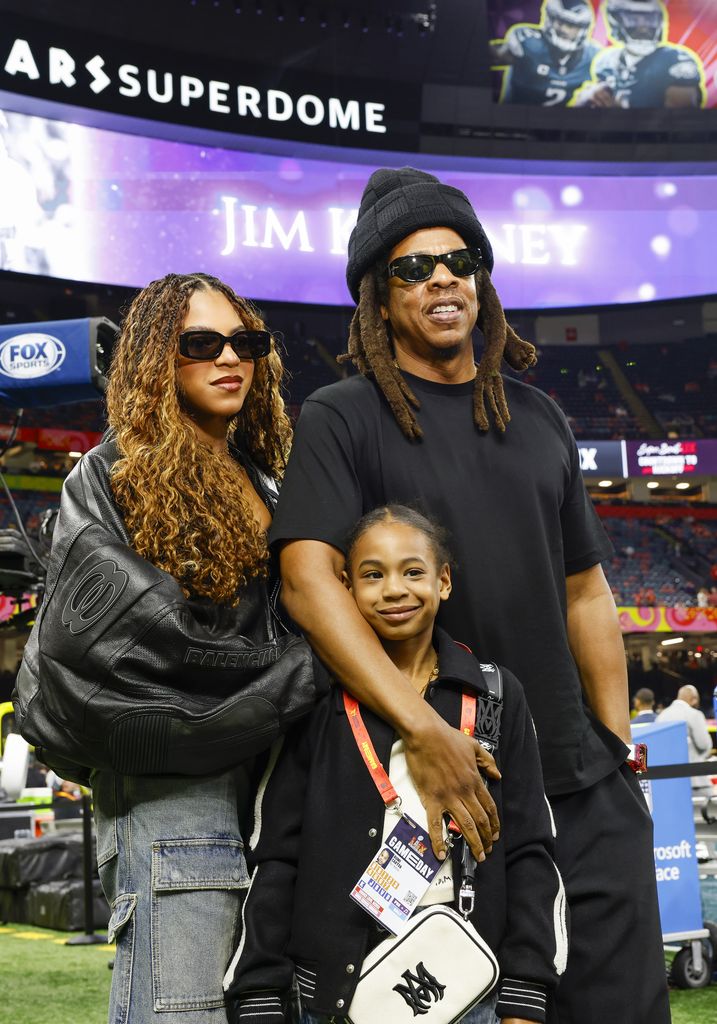Is there more to the story of Beyoncé's children than meets the eye? The speculation surrounding her twins, Rumi and Sir, as well as her eldest daughter, Blue Ivy, has sparked intense conversations across social media platforms. A bold statement emerged when a viral video claimed that one of Beyoncé’s daughters might be autistic. This assertion has drawn attention not only to the condition itself but also to how public figures handle personal family matters in an increasingly scrutinized world.
The debate intensified after a segment from the Cowboy Carter Tour surfaced where Beyoncé was seen congratulating her mother. Observers noted certain behaviors exhibited by Rumi Carter during this interaction, leading them to question whether she could have autism. While such claims remain speculative without official confirmation, they highlight broader societal issues regarding neurodiversity and celebrity privacy. As fans celebrate milestones like birthdays for Rumi and Sir, they simultaneously seek deeper understanding into what shapes these young lives under immense public gaze.
| Name | Beyoncé Giselle Knowles-Carter |
|---|---|
| Date of Birth | September 4, 1981 |
| Place of Birth | Houston, Texas, United States |
| Profession | Singer, Songwriter, Actress, Businesswoman |
| Spouse | Jay-Z (Shawn Corey Carter) |
| Children | Blue Ivy Carter, Rumi Carter, Sir Carter |
| Notable Achievements | 28 Grammy Awards, numerous chart-topping hits, influential cultural icon |
| Official Website | beyonce.com |
Autism spectrum disorder (ASD) represents a range of conditions characterized by challenges with social skills, repetitive behaviors, speech, and nonverbal communication. For years, discussions around ASD often revolved around misinterpretations or stereotypes, which can perpetuate stigma rather than foster empathy. In recent times, however, younger generations—millennials and Gen Z—are championing inclusivity and awareness, encouraging open dialogues about neurodiversity.
This shift is evident even within high-profile circles. Some speculate that famous parents like Madonna and Beyoncé may raise children who fall on the autism spectrum. Such assumptions are rooted less in evidence and more in observations made through media appearances. Yet, it underscores society's growing interest in understanding different developmental pathways while respecting individual boundaries.
Beyoncé herself occasionally shares glimpses of her family life, most notably in a heartfelt montage featuring rare footage of all three of her children: Blue Ivy Carter, Sir Carter, and Rumi Carter. These videos reveal moments of joy, growth, and connection, painting a picture of their evolving bond. Despite occasional controversies, Beyoncé remains steadfast in protecting her children's privacy, choosing discretion over sensationalism.
Rumi Carter, in particular, has become central to ongoing debates about autism representation in popular culture. Her interactions during public events have prompted some observers to suggest she might exhibit traits associated with ASD. However, diagnosing someone based solely on brief clips or images lacks scientific validity and disregards ethical considerations. It also raises questions about why celebrities are expected to disclose sensitive information about their families simply because they operate in the public eye.
A viral controversy erupted when a woman publicly accused Beyoncé of hiding Rumi's alleged autism diagnosis. Claiming that the superstar failed to use her platform for advocacy, this critic garnered both support and backlash. Supporters argued that increased visibility could benefit millions living with autism worldwide. Meanwhile, detractors emphasized the importance of safeguarding children's private health details against unwarranted scrutiny.
Such incidents reflect larger tensions between transparency and protection in modern parenting practices. They also invite reflection on how society views differences and whether presumptions hinder genuine progress toward acceptance. Ultimately, every child deserves dignity regardless of circumstance, including those born into fame.
Blue Ivy Carter, Beyoncé's firstborn, has long been admired for her precocious talents and expressive nature. Recently, theories suggesting she might be on the spectrum gained traction online. Proponents point to specific mannerisms captured in TikTok videos and other media outlets. Yet, just as with Rumi, any conclusions drawn without proper context risk oversimplifying complex realities.
Autism awareness extends beyond mere acknowledgment; it involves fostering environments where diverse learners thrive. Media portrayals play crucial roles in shaping perceptions, making accurate representations essential. Celebrities like Beyoncé wield significant influence, yet they too navigate delicate balances between sharing experiences and maintaining confidentiality.
In conclusion, while conjectures abound concerning Beyoncé's children and potential connections to autism, no definitive answers exist outside their immediate circle. What remains clear is the need for compassionate discourse centered on education, respect, and empowerment for all individuals along the spectrum. By prioritizing empathy over assumptions, society moves closer to embracing true diversity—not just in theory but in practice.



